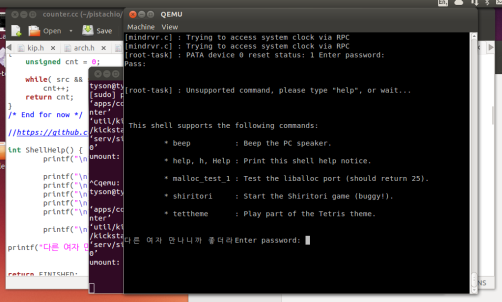Since it’s been a while since I last posted anything here, I thought that I’d briefly summarise what I’ve been doing over the past few months. If I get chance, I’ll probably follow up with more detailed posts, later.
I’ll also apologise in advance, if the quality of this post is below my usual standards – since I’m tired, and I’ll admit that it’s been quite a long time since I’ve produced any prose that’s more complex than one of my typical Tweets, e-mails, or IM/IRC sessions.
A Japanese Redux
As you can probably tell from this post’s title (Kon’nichi wa Wakusei/Hello, Planet), I’ve recently decided to resume learning Japanese using new techniques, after a multi-year hiatus – so that I can enjoy, and understand a multitude of content (music, blogs, and technical documentation, amongst other things); along with hopefully engaging in even more insightful and interesting conversations.
I’m already somewhat able to read and recognise text written in Katakana and Hiragana (providing that I’m undisturbed); and I seem to have a decent recall rate, according to the SayJack Hiragana listening quiz – although I’ll need to keep reading, listening and practising, in order to succeed in the long-term.
Obviously, I’m already capable of writing in Japanese using an Input Method Engine (I’m currently using Google’s – but I’ve also got a trial copy of ATOK in my “Downloads” folder), and can sort-of write a handful of characters on paper. My listening skills are also constantly improving.
I also realise that my Japanese vocabulary leaves much to be desired for – although I’m acquiring words and phrases as I progress; and I guess that it’s something that I’ll continue to do, long after understanding the basics.
The Epiphany
At ~5:03 am GMT, I had an epiphany in comprehending the phrase 「僕は日本語を学んでいます」(Boku wa nihongo o manande imasu/”I have learned [the] Japanese“) , after reading comments on a Google+ greeting post that I addressed to the author of the hiro99ma blog, and looking up the meaning of 「を」 (wo – pronounced “o”).
Collectively concluding that 「は」(ha) is pronounced differently, depending upon the context (it is pronounced “wa”, when used as a particle) probably also helped.
With a hint of irony, I also had to learn the Japanese words for “learning” and “learn” . (「学んで」(mana-n-de), and 「学ぶ」(mana-bu), respectively), in order to actually state “I’m (trying to) learn Japanese”), beforehand.
That aside, I’ll move on to my…
Personal and Commercial Projects
After obtaining an ACS ACR122U RFID/NFC/smartcard reader, I have been performing research into various proprietary, and standardised smartcard protocols; and have discovered a useful hardware modification – which I’ll document at a later date. Some of my research has culminated in writing Wireshark dissectors for the USB CCID class, MiFare, and FeliCa application protocols – all of which have been accepted upstream.
Regular readers of my posts on the OMAP3530 board, who have probably observed that I haven’t said much about it, after my last aborted attempt at getting Symbian^3 running on it might be interested in knowing that I’ve partially succeeded in getting RISC OS running.
I’ve also been working on an Android application, as part of my first ever contacting position – although I can’t provide any more information, right now.
University
As far as university is concerned, my first year was fairly successful. However, I’m having to resit an exam for the Computer Architecture & Systems Software module – since I struggled with my initial attempt, and ultimately failed (despite trying extremely hard, and participating in class/tutorial sessions).
I partially blame a combination of stress and exhaustion – from having to wake up at 5:30am, and spending hours on travelling, along with the “rapid-fire” lecture delivery style provided by tutors in cramped theatres (whilst having to cope with aching knees, and inferior long-distance vision (compared to ~10 years ago)), for my failure.
Obviously, that problem was only exacerbated by having to transcribe handwriting in poorly-chosen colours (usually orange or lime green) from dimly-lit whiteboards in “real-time”, along with listening to the lecture content – which meant that my understanding of the rather complex subjects involved was hindered.
I’m tempted to see if I can adapt some of the techniques that I developed for learning Japanese, in order to to make revision easier, and surviving lectures more bearable – although computational mathematics is obviously more of a theoretical subject than language learning, or software development are.
I’m hoping to be more successful at this attempt – since I realise that failure isn’t an option, when my future hinges on the outcome of said exam.
Conclusion
Although I’ve got a lot to say, and I’ve over-egged the pudding a little, I’ll stop here. I hope that gives others a good idea of what I’m doing these days, though.


